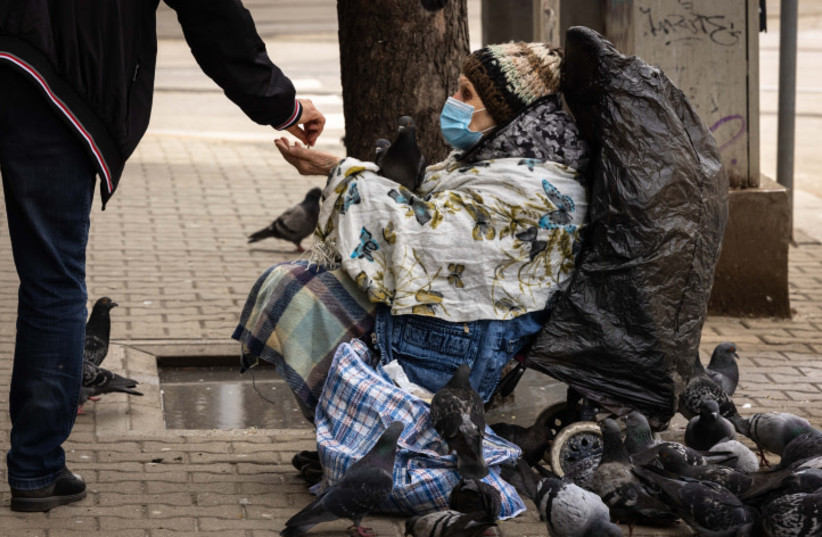You may have heard of Black Friday and Cyber Monday.
There’s another day you might want to know about: Giving Tuesday. The idea is straightforward. On the Tuesday after Thanksgiving, shoppers take a break from their gift-buying and donate what they can to charity.
Since I am not a big shopper, I don’t get bombarded with many advertisements via email or WhatsApp. So, after not seeing any Black Friday signs in store windows in downtown Jerusalem, I mentioned to my wife that “because of the war, I guess there will be no Black Friday specials in Israel this year.” She kindly responded that “they are calling it Blue Friday, and there are sales galore.”
In the past, I have railed against the whole Black Friday/Cyber Monday industry. Believe me when I say that nothing has changed in my perspective, but this year, I would like to take another approach. For those of you who need to shop and want to take advantage of big sales, I would encourage you to shop locally and help support local small and mid-sized businesses, which, due to Hamas savagery, are suffering financially. I believe that we have a moral obligation to do so.
The Shulchan Aruch (Code of Jewish law), in Yoreh De’ah 251:3, discusses whom to prioritize when it comes to giving charity. The order is as follows: The poor of the Land of Israel take precedence over the poor of other countries; the local poor take precedence over the poor from other towns and localities; and poor neighbors take precedence over the other poor people in the town. Therefore, we are obligated to support the local poor over the more ‘global’ poor.

The example of the sages
Maimonides, in the laws of Matnot Aniyim (Gifts to the Poor) 10:18, rules, “A person should always construct himself and bear hardship rather than appeal to people at large and make himself a burden on the community. Our Sages commanded, saying: ‘Make your Sabbaths as weekdays, and do not appeal to people at large.’ Even a distinguished sage who becomes poor should involve himself in a profession – even a degrading one – rather than appeal to people at large. It is preferable for a person to skin the hide of animal carcasses rather than tell people: ‘I am a great sage...”’or ‘I am a priest, grant me sustenance.’ Our Sages commanded conducting oneself in such a manner. There were great sages who were woodchoppers, porters of beams, water-carriers for gardens, and iron-smelters and makers of charcoal, but they did not ask anything from the community, nor did they accept gifts that were given to them.”
IN THIS week’s Torah portion, we read, “And all that You will give me, I shall surely tithe for You.” (Genesis 28:22)
On this verse, the commentary of Baalei Tosafot quotes from a Midrash: “Jacob our Forefather enacted the tithing of one’s wealth.”
The principle of tithing one’s income is found in the Talmud (Taanit 9b), in which our Sages learn from the extra, repetitive word in the verse: “You shall surely tithe” – to mean that you tithe, and you should become wealthy.
Indeed, we find that Jacob actually achieved great wealth in the merit of his vow to tithe everything he received, as the verse says, “The man spread out exceedingly, and he had great herds of cattle, and maidservants and servants, and camels and donkeys (Genesis 30:43).”
Topping his list of eight levels of charity, Maimonides writes, “The greatest level, above which there is no greater, is to support a fellow Jew by endowing him with a gift or loan, or entering into a partnership with him, or finding employment for him, in order to strengthen his hand so that he will not need to be dependent upon others.”
It would seem to me that buying from shop owners in both southern and northern Israel is the ultimate level of charity. It allows them to remain self sufficient rather than relying on handouts from the government or individuals. Self-sufficiency is in the DNA of all entrepreneurs; none of them want to resort to handouts. Whether it’s going to the myriad of pop-up fruit and vegetable stalls, where they sell their fresh produce, or purchasing fancy cream baskets from stores based near Gaza, or shopping at online stores featuring Olim from the North and South peddling their wares, the opportunities to help are endless.
There are those who say that the government will help. As is with most government help, it’s layered in bureaucracy and falls well short of its goals. Let’s do it ourselves and strengthen both our small businesses and our communities at the same time. We are all in this war together, and it’s incumbent on all of us to help out – and that includes helping those business’s impacted.
May all the families of the fallen be comforted. May the hostages be released. May the injured have a speedy recovery. May our dear soldiers be safe and protected.
Happy shopping!
Aaron Katsman is author of the book Retirement GPS: How to Navigate Your Way to a Secure Financial Future with Global Investing (McGraw-Hill). A licensed financial professional in both the United States and Israel, he helps people who open investment accounts in the US. Securities are offered through Portfolio Resources Group, Inc. (www.prginc.net). Member FINRA, SIPC, MSRB, FSI. For more information, call (02) 624-0995, visit www.aaronkatsman.com, or email aaron@lighthousecapital.co.il.
